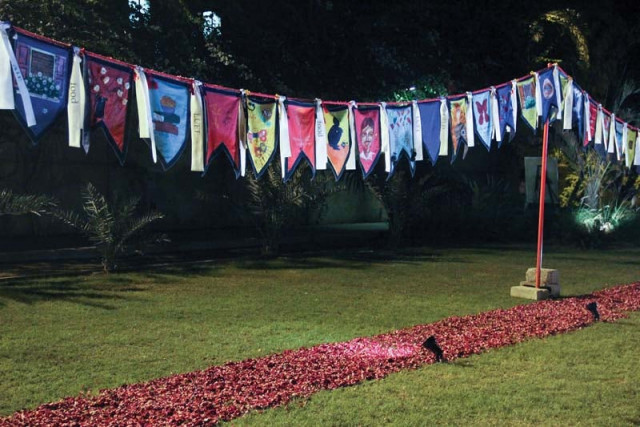German artist relives Baldia factory fire
Shares tale of 18-year-old who was killed the same day as he learnt that he was going to be a father

Conversations with the fire victims’ families were projected at ‘Cord of Desire’, while flags designed by artist Miro Craemer with the help of students of Indus Valley School of Art and Architecture and Iqra University North campus were displayed. PHOTO: AYESHA MIR/EXPRESS
German artist Miro Craemer narrated the tale of this youth who was among the approximately 260 people killed in the deadly blaze at a garment factory, Ali Enterprises. The launch of the project, titled 'Cords of Desire', took place on Tuesday. Conversations with the fire victims' families were projected while flags designed by the artist with the help of students of Indus Valley School of Art and Architecture and Iqra University North campus were displayed. The project is a collaborative initiative of the Goethe Institut and Vasl. The fabric was sown together by local tailors, focusing on the sense of community and interdependence within the sphere of textiles and art.
"Pakistan is home to the arts, the fabric and aesthetics of block printing, embroidery and bridal wear," said Craemer. "However, there is a long-boiling exploitation of the worker by the consumer!"
Surely these are positive signs of change in this industry, I hope and I believe in that, he said while talking about the project.
Speaking on the occasion, Pakistan Institute of Labour Education and Research executive director Karamat Ali termed the Baldia factory fire the worst tragedy that struck the nation. "That was the day when Pakistan's gas chamber was created," he said. "One came to know that [people of the] working class are easily disposable products!"
German consul-general Rainer Schmiedchen appreciated Cramer for dedicating his project to the victims and survivors of the Baldia factory fire. "This fire should not be forgotten!" he said. "And I [believe] that a lot has changed in Karachi's textile industry after the fire." Highlighting the contribution and social activism of Craemar, Schmiedchen said, "Miro, you have contributed to more awareness and I am proud to say that a German company and the German government have also contributed to remedy the situation. Following an agreement of September this year, a German company will pay again more than USD 5 million to the relatives of the victims."
According to Schmiedchen, the artist is on the right track with his concept of combining social commitment with glamour and beauty and thus showing that this commitment can be fun.
In his speech, the director of Goethe Institut in Karachi, Stefan Winkler, praised Vasl Artist Residency programme run under Adeela Suleman, who lent support to Craemar. "We are grateful to Suleman and her team to help support Miro Craemar and get him connected to the relevant actors in the city."
'Cords of Desire' is a project by German fashion and social designer Craemar, which is part of the two-month artist residency at Vasl Artist Collective's 'Urbanites - art and public space in Pakistan'. The German artist delved into his experience of talking with the victims' families and adding their narratives into the designed flags and artistic voices for the projection via photographs taken by Mahwish Rizvi and Ahsan Ali.
Craemar plans to take his work back to his hometown of Munich, Germany, to redisplay it in the near future.
Published in The Express Tribune, November 24th, 2016.



















COMMENTS
Comments are moderated and generally will be posted if they are on-topic and not abusive.
For more information, please see our Comments FAQ